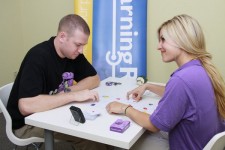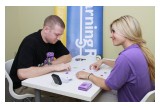
LearningRx Reviews Peer Reviewed Research and Real-Life Changes After Brain Training
Colorado Springs, CO, June 27, 2017 (Newswire.com) - The world’s largest one-on-one brain training company is releasing a list of scientific studies that answer the question, “Does brain training really work?” Below is a sampling from the list, which includes studies in peer-reviewed journals.
Disproving the placebo effect: Three studies
"Peer-reviewed research and over 18,000 client outcomes should help answer the question, 'Does LearningRx brain training really work?'"
Tanya Mitchell, Chief Research and Development Officer
• Frontiers in Psychology: LearningRx’s ThinkRx one-on-one cognitive training program was shown to improve cognitive skills with real life improvements in soldiers with moderate to severe traumatic brain injury (TBI) and acquired brain injury (ABI).
• Journal of Experimental Education: Learning, Instruction, and Cognition: Two studies on LearningRx brain training showed significant gains in cognitive skills.
• Applied Cognitive Psychology: A study of LearningRx one-on-one cognitive training showed significant gains in cognitive skills.
For a full list of studies on LearningRx one-on-one brain training programs, visit www.learningrx.com/research-science/studies-on-learningrx.
Why the controversy?
According to LearningRx Chief Research and Development Officer Tanya Mitchell, there are two main controversies around the validity of brain training.
“The industry is relatively young and it’s taken a long time for the general public to get the message that the brain is capable of changing at any age because we were always told it was stagnant. The second issue is that ‘brain training’ has become an all-encompassing umbrella term. Our one-on-one cognitive skills training gets thrown in with everything — from digital brain games and tutoring, to online test prep and group training. The reality is that they all serve a different purpose. We are hoping that this ever-growing list will show that there is a powerful evidence that personal brain training works.”
What to look for in a brain training program
“In addition to peer-reviewed results, consumers need to consider whether a program is a fit for them,” says Tanya Mitchell. “We encourage people to ask these two questions:”
1. Does this program provide the improvements I am looking for? (e.g., school struggles, weak attention or memory skills, decreased performance due to age or injury)
2. Does this program strengthen all seven cognitive skills, or only a couple? (most processing and learning struggles are due to a cluster of weak cognitive skills; see LearningRx's Client Outcomes and Research Results)
About LearningRx
LearningRx, headquartered in Colorado Springs, Colorado, is the largest one-on-one brain training organization in the world. With 80 Centers in the U.S. and locations in 40 countries around the globe, LearningRx has helped more than 95,000 individuals and families sharpen their cognitive skills to help them think faster, learn easier, and perform better. The company’s pioneering methods have been used in clinical settings for 35 years and have been verified as beneficial in peer-reviewed research papers and journals. To learn more about LearningRx research results, programs, and their 9.6 out of 10 client satisfaction rating visit http://www.learningrx.com.
Source: LearningRx
Share:


